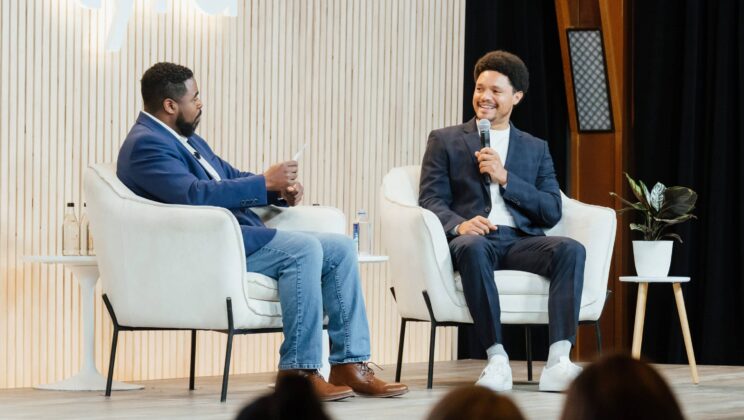Why Morgan Stanley is Prioritizing Employee Mental Health
June 2, 2020
In his three decades as a human resources leader at Morgan Stanley, Jeff Brodsky has helped see employees through the gamut of personal and professional highs and lows–including 9/11 and the 2008 financial crisis. These experiences have helped equip him to navigate the coronavirus pandemic as the company’s chief human resources officer.
As most of the company’s 60,000 employees worldwide work remotely during this crisis, a key focus for Brodsky has been supporting their mental health. Part of that support will come in the form of access to mental health care through Lyra. Recently, we sat down with Brodsky to learn more about what the company is doing to prioritize workforce mental health both now and in the pandemic’s aftermath, and what advice he would offer to other HR leaders during these tumultuous times.
As an HR leader for a large, multinational company like Morgan Stanley, what do you view as your core responsibilities and your mission?
The way I’d define my role prior to COVID-19 and today might be two very different things. As I think most people know, at Morgan Stanley, we don’t make widgets, we have intellectual capital. So in leading the HR function, we do everything from retaining, hiring, motivating, developing, and making sure our employees are well taken care of, and that we’re delivering world-class employees to our clients.
Why did Morgan Stanley decide to make mental health a priority for your employees?
Working in the financial industry for over three decades, I can't help but notice the stress that work places on people, and the resulting impact it has on their mental health. And generationally, we see the world changing. I think this is finally a time when people are comfortable accepting that mental health isn’t different from diabetes or cardiovascular disease.
Mental health conditions prevent people from living normal, healthy lives, and the more we talk about it and make it easy for people to access care versus treating it as taboo, the more we’re going to help people. I think there’s much more acceptance and recognition today that employees are more productive, less absent, and more in the moment when they’re not battling all the different issues they could be struggling with from a mental health perspective.
Another reason it’s so important is that companies today want to differentiate themselves. For me, that’s all about employee wellness, and the way you start to get at employee wellness is by focusing on mental health.
As you’ve been thinking about employee mental health at Morgan Stanley, what are some things you felt were broken that you wanted to try to fix?
If you take a fiduciary responsibility, which I do, you quickly realize that only changing your medical plans isn’t going to necessarily save money. It’s really about understanding how you spend your money and how you create an environment of overall employee wellness. I want people to use our health care benefits to help defer medical costs, and our wellness benefits to help prevent or cure their health care issues. To me, mental health sits in between [health care and employee wellness]. There’s so much around mental health care that is unmonitored, is not evidence-based, doesn’t have an end date, isn’t technology-enabled, and it’s limited by state lines. We wanted to find something in the U.S. to differentiate us from other companies.
We’d been talking about partnering with Lyra ahead of COVID-19, but COVID gave us an opportunity to really expedite the onboarding. We’re really excited to roll it out, because we don’t believe traditional EAPs are staffed in a way to work with this crisis. Being able to offer people access to high-quality mental health providers with Lyra in a timely and virtual way is going to be fantastic.
If someone wants to champion mental health care at their organization, how can they make that case to senior executives?
I really believe the economic case to provide more mental health care can be made with data and metrics. It would be disingenuous not to say that we spend a lot of money on mental health care, on rehab, and on drugs that would be unnecessary if someone felt more capable mentally. If someone deals with a mental health issue early, it’s much less expensive than dealing with it later when it may create other consequences for the body or mind. It’s also about turnover, absenteeism, and productivity. Some of those metrics are really hard to define, but if you put enough of them together, it's a no-brainer.
Mental health affects sleep, it affects your mindset, it affects the way people interact and behave. I’m seeing the mental fatigue from so many people right now, and if we don’t help them get through that, it’s going to cost us in terms of opportunity costs and in business opportunities, and we’ll lose good people. When you put all that math together and take the time to look at it, these are some of the easiest decisions organizations can make.
How do you feel this pandemic is impacting mental health, both at Morgan Stanley and societally?
Everyone’s experience is different. You’ve got younger professionals who are quarantining alone, you’ve got the couples–whether they’re significant others or roommates–who have been forced together, often in close quarters. People are feeling the loss of freedom and the loss of the way life was, and that’s real grieving.
Of course, there is also the tragedy of lives lost from COVID-19, and that includes some of our own employees. I’ve been trying to rationalize in my own mind, how am I going to go back to work and walk past their desk every day, and know that this awful thing has taken them? We all know people who have died from this, so you have to have quality grief counseling in place.
And employees have a lot of unanswered questions: How am I going to go back to work, and what’s that going to feel like? Am I going to have an anxiety attack, is my boss judging me, or is someone going to judge my performance if my 4-year-old is on my lap during a Zoom call? When you aggregate all those pressures, what does that do to the mindset? I’m worried about life post-coronavirus, because I don’t think we really understand the degree to which people will be suffering.
How are you communicating about mental health resources and what suggestions would you give other HR professionals related to employee communications right now?
We’re doing a lot of virtual training for our managers, and a key component of that is helping them understand what employees are going through. Through our newsletters, emails, and other outreach, we’re focusing on open, honest communication around mental health and the resources that are available.
Also, if your organization has mid-year evaluations, I would recommend using them to check in with employees. You can avoid using the word “evaluation”, which is really about performance, and instead think of it differently. We want to be able to use those one-on-one conversations as an opportunity to check in with employees, and understand how they’re dealing with quarantine and what challenges they’re facing.
We also want to know how COVID has changed the way people are thinking about their 2020 goals, and what their expectations were for this year. Maybe they thought this was the year for a big promotion and fear that can’t happen now, or they have kids, and child care is going to be a challenge for them. Encouraging these one-on-one conversations to understand what people are dealing with is crucial.
Of course, as HR professionals, we’re always worried about someone going a step too far and creating a legal liability. So my advice on that would be to create boundaries for your managers so they know when to bring HR in to help, and also, to let managers take a little risk. Now is not the time to worry about perfection, it’s the time to embrace people in what they’re experiencing and help as many people as possible get back to whatever the “new normal” will be.
How are you thinking about the return to work and what you’re prioritizing as people prepare to come back into the office?
I think it’s about really prioritizing that which is necessary from that which is not, and figuring out how much productivity gain you get by having people co-located. How do you weigh that against the cost of an outbreak, or the cost of one life–how do you measure that?
So many organizations are successful working remotely today. There’s no vaccine, there's no cure, and antibody testing isn’t really giving people the assurance they want right now. My thinking is when a city reopens, let them open for a few weeks. Does transportation feel safe? Are people out and about? If I go to work, can I get a cup of coffee, or lunch? Let the cities open up, then bring people back in small groups.
I would be very willing to let employees opt out of returning to the office, as long as they’re working effectively and productively from home. I also worry about possible discrimination that could evolve, consciously or not, between those who’ve returned to the office and those who haven’t. How do you remove all that bias from the workplace?
Is there any other advice you would give to HR professionals as they consider the mental health impacts on their workforces in the weeks and months to come?
In the world of corporate America, HR teams are first responders, and we shouldn’t minimize the impact this pandemic has on them. Please make sure to take care of yourselves. I think the number one rule is if you yourself aren’t okay, it’s very hard to create the space and capacity to help other people. And, encourage people to find quality mental health care providers. No one should be too big, too much, too afraid, or too ashamed to get mental health care. It makes all the difference.
CONTACT US
If you want help connecting with a therapist, Lyra can assist you. You can get started today if Lyra is offered by your employer. Sign up now.
For employers who want to learn more about how Lyra addresses network adequacy and quality issues, download our whitepaper on quality or get in touch.
And check in frequently here or follow us on Facebook, LinkedIn, and Twitter for more insights into supporting employees’ mental health.
Explore additional blogs

Mental health at work
How to Spark Intrinsic Motivation on Your Team

Mental health at work
From Human Resources to Whole Humans: Rethinking Productivity With Trevor Noah

Mental health at work